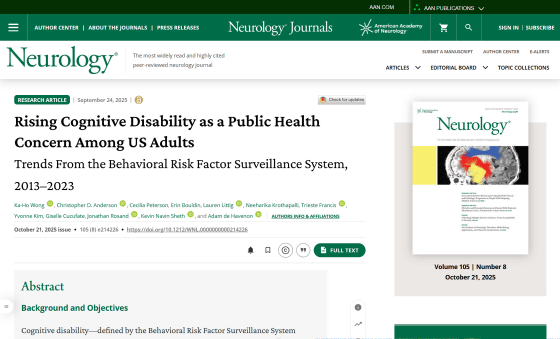Memory and thinking problems are on the rise among Americans under 40

A study by
Rising Cognitive Disability as a Public Health Concern Among US Adults | Neurology
https://www.neurology.org/doi/10.1212/WNL.0000000000214226

Sharp rise in memory and thinking problems among US adults, study finds: Neurology Resources | AAN
https://www.aan.com/PressRoom/home/PressRelease/5286
Memory Problems Are Surging in Adults Under 40, Large US Study Finds : ScienceAlert
https://www.sciencealert.com/memory-problems-are-surging-in-adults-under-40-large-us-study-finds
The American research team analyzed data on more than 4.5 million American adults collected from 2013 to 2023 through the CDC's Behavioral Risk Factor Surveillance System (BRFSS) . Participants were asked, 'Do you experience significant difficulty concentrating, remembering, or making decisions due to a physical, mental, or emotional condition?' Those who answered 'yes' were classified as having a cognitive impairment. The analysis excluded data from 2020, when the COVID-19 pandemic had a significant impact, and data from people who reported depression.
The analysis found that the percentage of people in the United States with cognitive disabilities is increasing from 5.3% in 2013 to 7.4% in 2023. The initial upward trend began in 2016 and continued through the pandemic. The graph below shows the trend in the percentage of people with cognitive disabilities over time.

'Declining memory and thinking skills are emerging as major health problems reported by American adults,' said study co-author Adam de Havenon, a vascular neurologist at Yale University. 'Our study shows that these problems may be particularly prevalent among young adults, and that social and structural factors likely play an important role.'
The graph below shows the trend in the proportion of people with cognitive impairment by age group. The largest increase was seen among young people aged 18 to 39, where the proportion of people with cognitive impairment nearly doubled from 5.1% to 9.7%. Meanwhile, the proportion of people aged 70 and over declined slightly, from 7.3% in 2013 to 6.6% in 2023.

The increase in cognitive impairment was observed across most groups, regardless of race or economic status, but the rate and percentage of increase were influenced by various factors. Economic status had a particularly large impact: For Americans with household incomes of less than $35,000, the prevalence rose from 8.8% to 12.6% over the study period. Meanwhile, for Americans with household incomes of more than $75,000, the prevalence rose only from 1.8% to 3.9% over the same period.
Additionally, among adults without a high school diploma, the proportion of people with cognitive disabilities will increase from 11.1% in 2013 to 14.3% in 2023, and among those with a college degree, the proportion will increase from 2.1% in 2013 to 3.6% in 2023. By race, the highest prevalence of cognitive disabilities was among Native Americans, increasing from 7.5% to 11.2%, among Hispanics from 6.8% to 9.9%, among Blacks from 7.3% to 8.2%, among Whites from 4.5% to 6.3%, and among Asians from 3.9% to 4.8%.
'These findings suggest that memory and thinking problems are increasing most rapidly among people who already face structural disadvantage. We need to better understand and address the underlying social and economic factors that may be driving this trend,' said de Habenon.
The research team suggests that the rise in cognitive impairment among American adults may be due to a combination of factors, including an increased tendency for people to report mental health issues, the lingering effects of the COVID-19 pandemic, increased uncertainty about work, and an increased reliance on digital tools.

Colin Lewis , a researcher in AI and data science, argues in his blog that social media, which steals people's attention, and search engines, which outsource memory, are the causes of cognitive impairment.
Under 40's Declining Memory - The One Percent Rule
https://onepercentrule.substack.com/p/under-40s-declining-memory
'The youngest generations, who have never known a world before these devices, report that they can no longer concentrate, remember, or make decisions,' Lewis said. 'Even a friend of mine, a disciplined novelist who could once immerse herself in a text for hours, now tells me she can no longer read a book.' 'Her failure is no longer moral, it's systemic. She's not weak; she's a collateral victim of being constantly online.'
Lewis points out that a population that loses its ability to concentrate, remember, and make decisions is not just unproductive, but also affects the political system: Democracy relies on citizens being able to understand multi-paragraph arguments and remember candidates' past promises when voting, but the loss of cognitive abilities makes it difficult to make rational decisions.
Lewis argued that 'people who have lost their memory are doomed not only to repeat their past actions but also to believe what they have been told. The political question of this century is no longer 'Who controls the means of production?' but 'Who controls the means of knowledge?''
Related Posts:
in Science, Posted by log1h_ik







